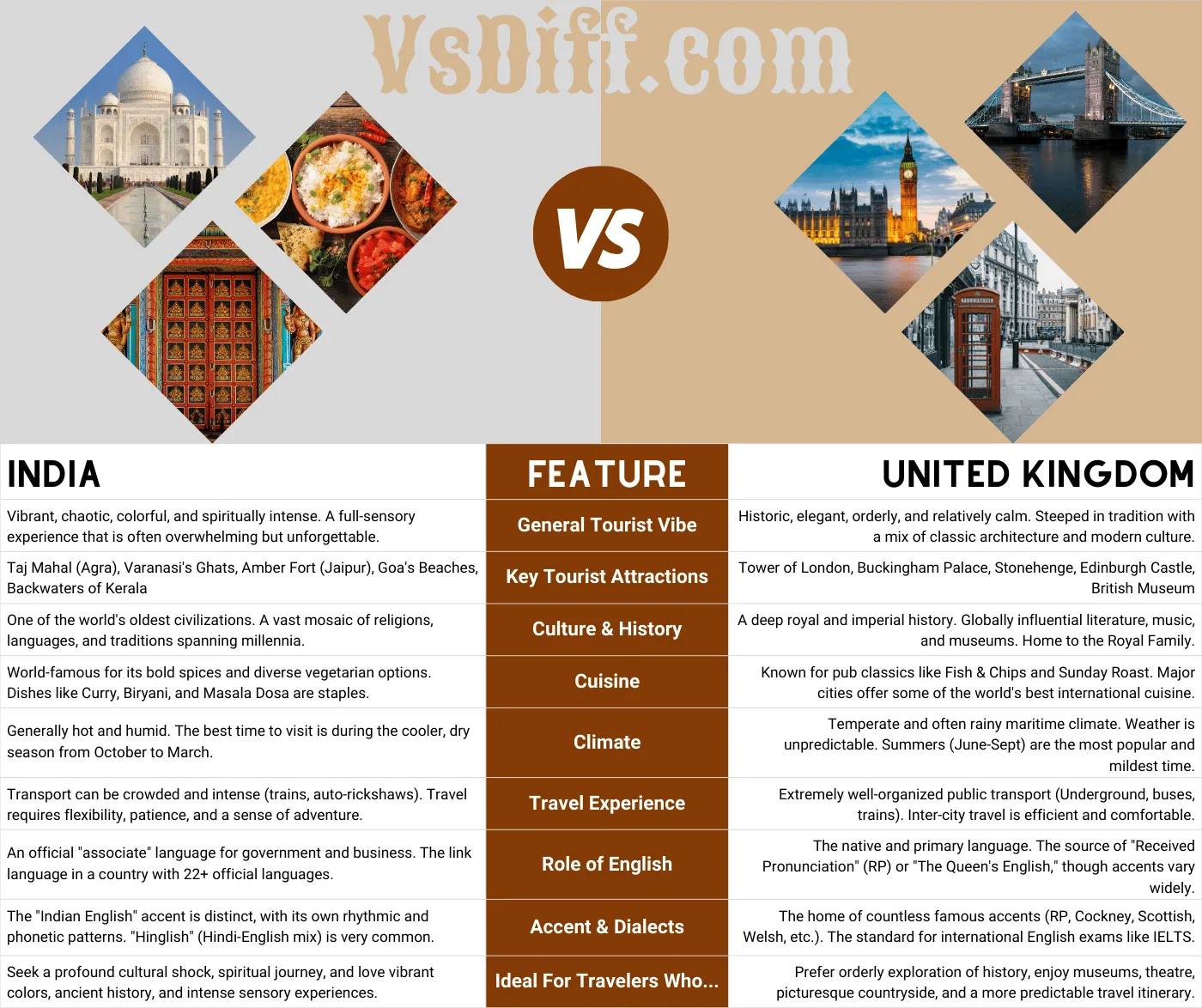Planning a trip and not sure whether to visit India or the United Kingdom? Both countries offer unique experiences, rich cultures, and unforgettable journeys. Here’s a detailed comparison to help you decide which destination suits your travel style better.

India vs UK Comparison Table
This table highlights the key differences between India and the UK in terms of culture, food, climate, history, and overall travel experience.
| India | Feature | United Kingdom |
|---|---|---|
| Vibrant, chaotic, colorful, and spiritually intense. A full-sensory experience that is often overwhelming but unforgettable. | General Tourist Vibe | Historic, elegant, orderly, and relatively calm. Steeped in tradition with a mix of classic architecture and modern culture. |
| Taj Mahal (Agra), Varanasi’s Ghats, Amber Fort (Jaipur), Goa’s Beaches, Backwaters of Kerala | Key Tourist Attractions | Tower of London, Buckingham Palace, Stonehenge, Edinburgh Castle, British Museum |
| One of the world’s oldest civilizations. A vast mosaic of religions, languages, and traditions spanning millennia. | Culture & History | A deep royal and imperial history. Globally influential literature, music, and museums. Home to the Royal Family. |
| World-famous for its bold spices and diverse vegetarian options. Dishes like Curry, Biryani, and Masala Dosa are staples. | Cuisine | Known for pub classics like Fish & Chips and Sunday Roast. Major cities offer some of the world’s best international cuisine. |
| Generally hot and humid. The best time to visit is during the cooler, dry season from October to March. | Climate | Temperate and often rainy maritime climate. Weather is unpredictable. Summers (June-Sept) are the most popular and mildest time. |
| Transport can be crowded and intense (trains, auto-rickshaws). Travel requires flexibility, patience, and a sense of adventure. | Travel Experience | Extremely well-organized public transport (Underground, buses, trains). Inter-city travel is efficient and comfortable. |
| An official “associate” language for government and business. The link language in a country with 22+ official languages. | Role of English | The native and primary language. The source of “Received Pronunciation” (RP) or “The Queen’s English,” though accents vary widely. |
| The “Indian English” accent is distinct, with its own rhythmic and phonetic patterns. “Hinglish” (Hindi-English mix) is very common. | Accent & Dialects | The home of countless famous accents (RP, Cockney, Scottish, Welsh, etc.). The standard for international English exams like IELTS. |
| Seek a profound cultural shock, spiritual journey, and love vibrant colors, ancient history, and intense sensory experiences. | Ideal For Travelers Who… | Prefer orderly exploration of history, enjoy museums, theatre, picturesque countryside, and a more predictable travel itinerary. |
Which Destination Should You Choose?
If you want an immersive cultural adventure filled with vibrant colors, spirituality, and ancient history, India is the ideal choice. If you prefer a structured travel experience, world-class museums, and royal heritage, the UK might be a better fit.
Frequently Asked Questions (FAQ)
Which country is cheaper to travel to, India or the UK?
India is generally more budget-friendly, with affordable accommodation, food, and transport. The UK tends to be more expensive, especially in major cities like London.
Which is better for history and culture, India or the UK?
Both countries are rich in history and culture. India offers ancient civilizations, temples, and traditions spanning millennia, while the UK is famous for royal heritage, castles, and museums.
When is the best time to visit India and the UK?
The best time to visit India is from October to March, when the weather is cooler and drier. For the UK, summer (June–September) is the most popular time due to milder weather.
Which cuisine is more diverse, Indian or British?
India is world-famous for its diverse, spice-rich cuisine with many vegetarian options. The UK is known for traditional dishes like fish and chips but also offers excellent international food in major cities.
Is English widely spoken in India?
Yes. English is an associate official language in India, used in government, education, and business. However, it is spoken alongside many regional languages.